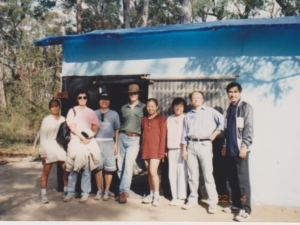
Cross Over to the Other Side
For Christians, the word ‘cross’ symbolises the centrepiece of our faith. However, it is also a verb which denotes an action, a definite and deliberate

Kelvin and his wife are national workers serving in Zambia. Kelvin is involved in the many aspects of the Lord’s work within Zambia and globally, including distribution of literature. They have 4 children and 1 grandson. They are currently based in Zambia at Musenga Mission, Chingola, on the Copperbelt.
In the beginning
Standing in the naked innocence in the newness of life and with speechless awe of their Creator, Adam and Eve were about to receive on behalf of humanity (that includes us) a blessing that would also act as their ‘marching orders’, or mandate, as the image bearers of God in this new world.
We are allowed to listen in as the writer in Genesis records it in chapter 1. The Triune God speaks: “Be fruitful and increase in number; fill the earth and subdue it” (Gen 1: 28). It seems simple and clear.
The statement is a covenant, a two-way promise that God is making with humanity. God is taking a risk, as He pronounces the promise over them and for all generations to come! But as any covenant, we have a responsibility to fulfil, a role to play, in order to be ongoing participants and recipients of the covenant’s blessing.
God’s desire for multiplication, movement, and action was made clear from the first words He spoke to those who would have the privilege and responsibility of bearing His image.
The new creation
The rest of Scripture shows us how God would constantly move His people around the earth, spreading them so that the light of His image, glory, and goodness would burn bright and fill the whole earth.
When God the Son came in human likeness to the earth He reiterated this mandate to those who would follow Him on the earth, He put it this way:
‘Therefore go and make disciples [be fruitful] of all nations [fill the earth]… teaching them to obey everything I have commanded you [including my last command ‘Go make disciples’, i.e. multiply]. And surely I am with you always, to the very end of the age’. (Matt 28:19-20).
The first creation, Adam and Eve, received the mandate and now we, as the new creation through Jesus Christ, have received it also. Nothing has changed in purpose, from when humanity was given it in the garden.
We are to keep being fruitful, multiplying, growing the family of God, making more of those who will identify and relate to the Godhead until the whole earth is filled with those who worship God.
We see throughout history God uses the spreading of His people across the world to keep them pursuing the relationship and role we are privileged to have
Kelvin Samwata, National Worker, Chingola, Zambia Tweet
Until there are family members from every tribe, tongue, and nation.
And we see right from the beginning of time that God intended all His people, the believers in Christ, to be involved with Him, on the move, filling the earth with those who reflected His image. We see throughout history God uses the spreading of His people to keep them pursuing the relationship and role we are privileged to have.
Trusting God
Despite the turmoil of our world, Christians as God’s people can trust God’s purposes for our lives in the world He created, the world into which He has sent us to be His witnesses. ‘As the Father has sent me, I am sending you’ (John 20: 21). Whatever our personal circumstances and situations, or whatever is happening in the global world order, God is ultimately in control, and therefore, we can entrust our lives and futures to him with absolute assurance that all will be well.
The slave girl in 2 Kings 5 knew her God without a shadow of doubt, despite her hopeless circumstances. She knew she was held as a slave for God’s eternal purposes. I can only imagine how Naaman viewed his slave girl after his trip to Israel, where he was not only healed of leprosy but believed in the God of heaven.
Who had real power, the slave girl or Naaman?
You see, the slave girl understood very well what it meant to be a missionary, her captor was her target of reaching with the Eternal message of the God of Israel.
In the eighteenth century, Moravian missionaries were ordinary people working in the market places wherever they went. They were trained to share their faith story in in the daily context of working life in the West Indies, coming alongside slaves on the sugar plantations. Their skill and the humility by which they worked helped to strengthen their message and draw people to them.
Their goal was to identify with the people, seeing themselves as equals and friends. It was not preaching or teaching that worn people over; it was the concern, love, and gentle patience the hardworking Moravians showed in their work and to their workmates.
Made for this purpose
If we are to see a major shift in thinking and behaviour, we need to change both our theology and language. Everyone who claims to be a follower of Jesus Christ is ‘full time’ in the purposes of God. We have been made for this purpose and this purpose alone. Work is part of our life and therefore the place where we primarily get to reflect His glory and goodness. No one is excluded from this task. The Lord Jesus became a servant to the slaves to Sin, so that He could win us to His Father.

For Christians, the word ‘cross’ symbolises the centrepiece of our faith. However, it is also a verb which denotes an action, a definite and deliberate

“Why not try to paint a picture based on your favourite hymn?” There are many hymns I love, so it’s always hard to choose a

I was raised in a Christian family and was 12 when the Lord called my parents to missionary service. Seeing other countries and cultures was

“You’re not Irish!” he said with a derogatory smile on his face. I was confused, because I thought I was. Some might quip that it

What playlist have you planned to use this summer and what’s it called? Nowadays many of us use playlists on our phones or tablets to

Some words can provoke a reaction. I have sometimes spiced up a conversation with friends by dropping in a word that I know will be

What do you think is the greatest challenge for missionaries? Apparently it’s not necessarily the uncomfortable climate, the unfamiliar diet, the difficulties of language, the

Interesting times we live in! Even if you were alive for the last global pandemic, none of us have experienced anything like this before. The

In this blog, let us think about how our strategies in mission compare with the early church in Acts. Here are two passages from Acts which

Standing one evening with my grandson, who was three years old at the time, we were gazing into the dark night sky. Trying to be

God’s call to us was progressive, slow and measured. Probably, in my case, it started when I was born to missionary parents who came from

Coronavirus: the word on everyone’s lips and the fear in (almost) everyone’s hearts. Response to the pandemic has been mixed. We cannot fail to be

With every job description comes information about the task at hand: what have I to do? Who do I report to? What resources are available

What does it mean to waste life? This is a burning question that all human beings need to face as individuals. Many are wasting the

Being a missionary is not an occupation that many young people would consider these days. When I started as a missionary, there was no salary,

It was toward the end of 1989 when the Lord stopped me in my tracks. For years I had heard the gospel through a Christian

In Acts 8:26-35, we eavesdrop as Philip shares the Message of Jesus with a fellow-traveller. 1) Listening to God (8:26, 29) Philip was a person open

In my first blog I mentioned how important Christian camps have been to us as a family and especially to our two boys Josiah and Joseph.

What should our strategy for mission be?That’s a question many books and articles seek to grapple with. But whilst a lot of these strategies are

These were the remarkable words that Jesus said to his disciples. They’d seen that the crowd who were there to listen to Jesus were in
If you would like to receive information about our next events feel free to sign up to our mailing list.
© Copyright 2019 GLO Europe. All Rights Reserved | GLO-Europe is a charitable Trust based at 78 Muir Street, Motherwell, ML1 1BN.